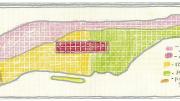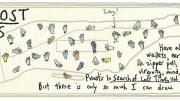Wonder Women: Sex, Power, and the Quest for Perfection, by Debora L. Spar, Ph.D. ’90 (Farrar, Straus and Giroux, $27). The author, now president of Barnard College, formerly of the Harvard Business School faculty, begins by remembering “the moment I knew I was having it all”—and explores the burdens that have resulted for “women of my so-called postfeminist generation.”
Mapping Manhattan, by Becky Cooper ’10 (Abrams, $19.95). The author walked through Manhattan, handing out blank maps and soliciting recipients’ drawings of their city. The result, subtitled “A Love (and Sometimes Hate) Story in Maps by 75 New Yorkers,” is clever, engaging, and emotionally resonant in all the ways that famous island is itself.
The Federal Reserve: What Everyone Needs to Know, by Stephen H. Axilrod ’48 (Oxford, $16.95 paper). As if years monitoring the economy and fighting inflation weren’t challenge enough, this Fed veteran, with long subsequent financial-services experience, has written a reader-friendly, slender book, in question-and-answer format, to demystify the central bank.
The Numbers Game: Why Everything You Know about Soccer Is Wrong, by Chris Anderson and David Sally ’82 (Penguin, $16 paper). Anderson, of Cornell, and Sally, visiting associate professor of business administration at Dartmouth, put aside their academics for their passion, and bring quantification and data analysis to “the beautiful game.”
The Founding Conservatives, by David Lefer ’93 (Sentinel, $29.95). The author, a former Ledecky Undergraduate Fellow at this magazine, now industry professor at New York University’s Polytechnic Institute, examines how John Dickinson, James Wilson, Roger Morris, Silas Dean, and others helped shape America’s original principles and in so doing, the subtitle says, “saved the American Revolution” and planted the seeds for contemporary conservatism.
Every Love Story Is a Ghost Story: A Life of David Foster Wallace, by D.T. Max ’83 (Viking $27.95, Penguin $17 paper). A New Yorker staff writer’s biography of the author of Infinite Jest, a suicide in 2008, explores Wallace’s graduate studies in philosophy at Harvard, from which he withdrew in crisis.
Reflections on Judging, by the Honorable Richard A. Posner, LL.B. ’62 (Harvard, $29.95). Drawing on 31 years of experience on the U.S. Court of Appeals for the Seventh Circuit, the author—a remarkably prolific writer—weighs in on the practical details of advocacy, opinion-writing, and legal training, and on the virtues of legal realism as opposed to formalist doctrine. He’s a fan of Holmes, Brandeis, Cardozo, Friendly, et al.
Presidential Leadership and the Creation of the American Era, by Joseph S. Nye Jr., University Distinguished Professor (Princeton, $27.95). With the Arab world in transition, a newly powerful China, and other rising nations on the horizon, what is the role of the U.S. president in forging a new world order—or managing what is on the agenda, transactionally? Nye compares Wilson and Reagan to Eisenhower and Bush 41, and finds the latter sometimes more successful.










